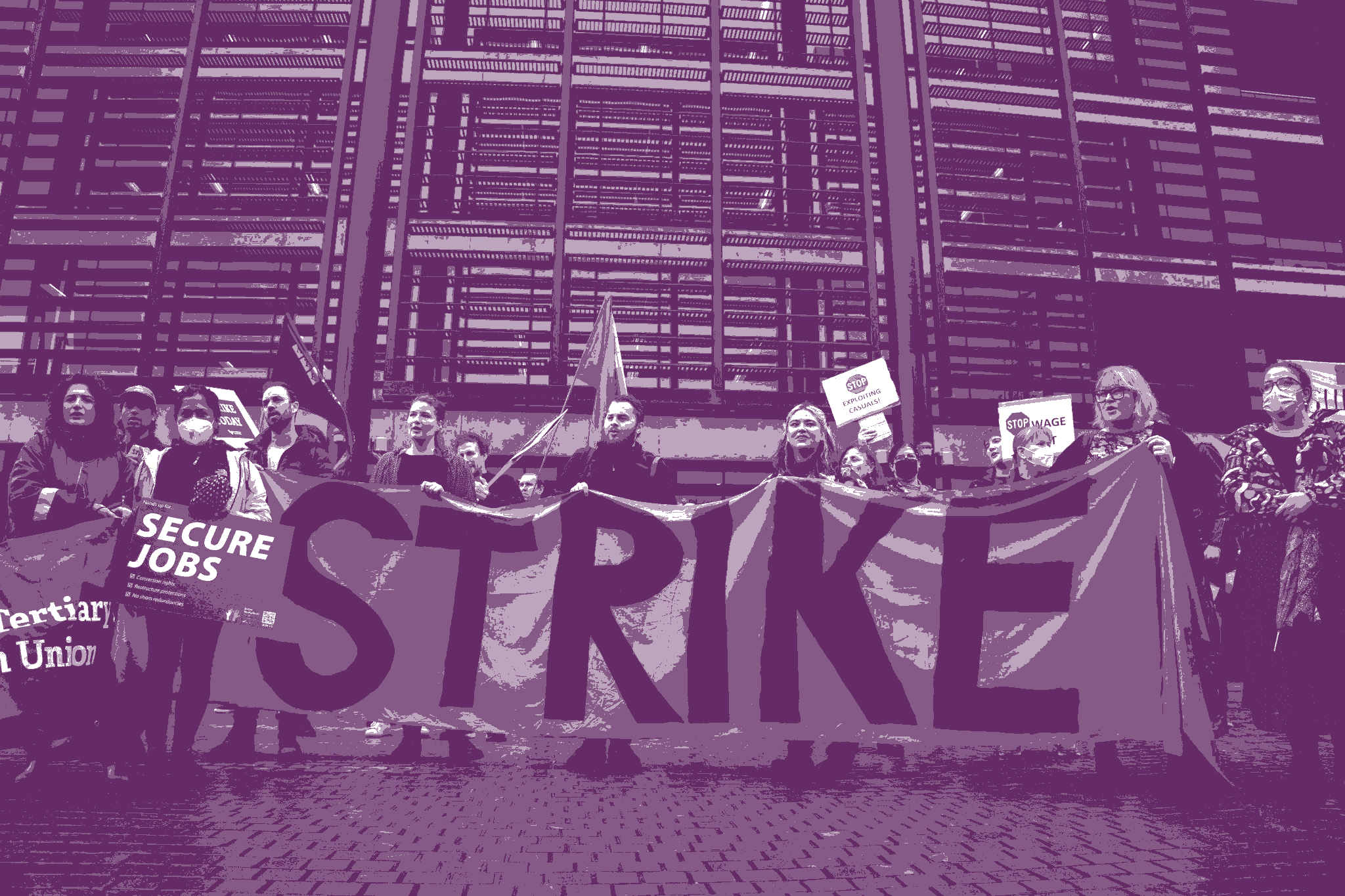Rank and File Lessons from Sydney Universities
(This article is drawn from our rank-and-file activity at the University of Sydney (USyd) and University of New South Wales (UNSW). We don’t presume that organising is identical across other campuses and encourage comrades to consider and share their own organising experiences).
About every four years, the enterprise agreements at Australian universities expire, and workers bargain for new ones. These bargaining periods often represent the high watermark of union membership growth and activity: staff become invested in the clauses governing their wages and working conditions over the next few years, union activity visibility heightens, and picket lines flare up across campus.
During the last bargaining period, across the main Sydney campuses, organised rank-and-file members within each branch of the National Tertiary Education Union (NTEU) drove the most militant union activity. At USyd, this was through a ticket called Rank and File Action (RAFA) which currently holds a majority on their branch committee; at UNSW, activists often acted in opposition to their comparatively conservative branch committee and bargaining team. For a more in-depth recount of the bargaining period at USyd and UNSW, read the online version of this article.
Now that bargaining has ended at these campuses, the question is: how can rank-and-file activists maintain the natural energy which sparked up during bargaining periods – both in preparation for the next bargaining round, but also to fight for a fairer university and world?
Enforcing Enterprise Agreement Clauses
Union branch activism at universities mostly lulled mid-2023. During this period, RAFA activists at USYD focused upon ensuring that their strengthened enterprise agreement clauses were actually enforced. Events like staff information sessions attracted staff who had been ignorant or felt disconnected from the industrial campaign but were curious about the benefits of the new clauses.
A commitment to regular organising paid off in August, when the USYD Vice Chancellor emailed staff explaining a ‘general expectation’ that all staff would return to campus for the majority of the work week. This went directly against one of the new enterprise agreement clauses granting all professional staff remote work rights which could not be ‘unreasonably refused’. Over 1,100 staff signed a members’ petition campaigning for the clause’s enforcement and about 150 professional staff attended a remote work information session. In response, university management backed down on the requirement for staff to work most days on campus.
Palestine Organising
On October 15, during Israel’s escalated genocide on Gaza, Birzeit University (located on the West Bank) called upon international academic institutions, unions, staff, and students to take action to oppose Israel’s war and end Zionist settler colonialism.
This call coincided with a groundswell of rank-and-file activity in support for Palestine, including at universities. RAFA members at USyd quickly called a members’ meeting to pass a solidarity motion; organised a forum about academic BDS; and initiated a ‘Workplace Week of Action for Palestine’, draping banners off of the City Road Footbridge, flying flags out of office windows, and posting about upcoming rallies and actions on staff portals. Rank-and-file UNSW staff, too, organised a well-attended on-campus forum and vigil.
However, union leadership has opposed pro-Palestinian activism on both a branch and state division level. At UNSW, rank-and-file activists submitted a pro-Palestinian members’ motion to the branch committee and requested the branch committee to call a members’ meeting to vote upon it. After a month of stalling and many emails from some of the sixty signatories to the motion, the branch committee finally called a meeting. During the meeting itself, the Branch Secretary spoke against the motion, argued that it did not represent ‘all workers’, and threatened to resign if it passed, a promise he was forced to make good upon once 96% of the meeting voted in favour of it. Similarly, rank-and-file comrades on the NSW NTEU Division Council requested the Division Secretary to amend a weakly supportive pro-Palestine motion to include concrete solidarity actions, including support for academic BDS and examining universities’ financial and research ties with Israeli arms manufacturers. Shamefully, the Division Secretary refused to include these amendments.
These instances are worth mentioning not because union motions have monumental significance in the face of a genocide, but because they demonstrate the importance of principled rank-and-file opposition against a union bureaucracy reluctant to commit itself to symbolic, let alone concrete, actions of solidarity.
Rank-and-file activists now need to channel the energy from rank-and-file campaigns against union bureaucracy towards longer-term campaigns. Luckily, there is a rich history of pro-Palestinian activism at universities. This year marks twenty years since the Palestinian BDS National Committee first called for a boycott of Israeli academic and cultural institutions. Moreover, many Australian universities have research ties to Israeli arms manufacturers. For example, as part of its defence Trailblazer program, UNSW has partnerships with Lockheed Martin, Raytheon, Thales and Northrop Grunman.
Universities produce the workers and research which make the capitalist war machine tick. Rank-and-file campaigns should not only fight for universities to stop aiding and abetting genocide, but for a system of education which puts people’s liberation before profit.
Conclusion
Staff and student unions should stand for safe working conditions everywhere, which are obviously impossible in occupied Palestine. At the time of writing, the IDF has destroyed or severely damaged every university in Gaza has been destroyed or severely damaged by the IDF.
Hearteningly though, we have already seen either the success of long-term pro-Palestine and anti-Zionist campus organisations, as well as the development of new groups. Now rank-and-file unionists have been jolted into action during a period of usual inactivity, benefiting from the groundwork of organisation laid down during bargaining and the enforcement of new enterprise agreement clauses. The next challenge is to sustainably foster this exciting burst of rank-and-file activity.
